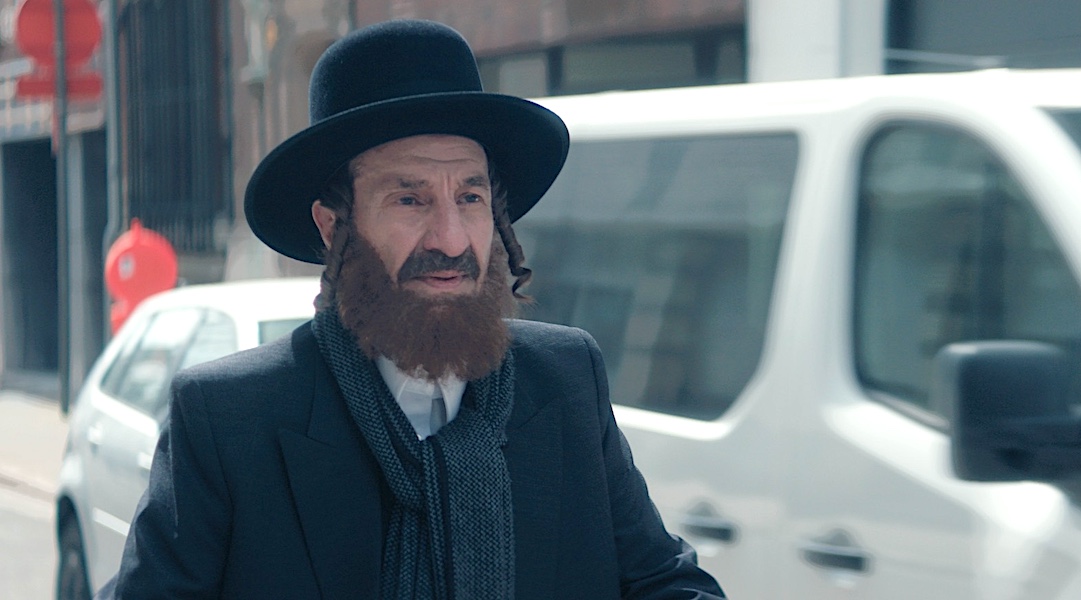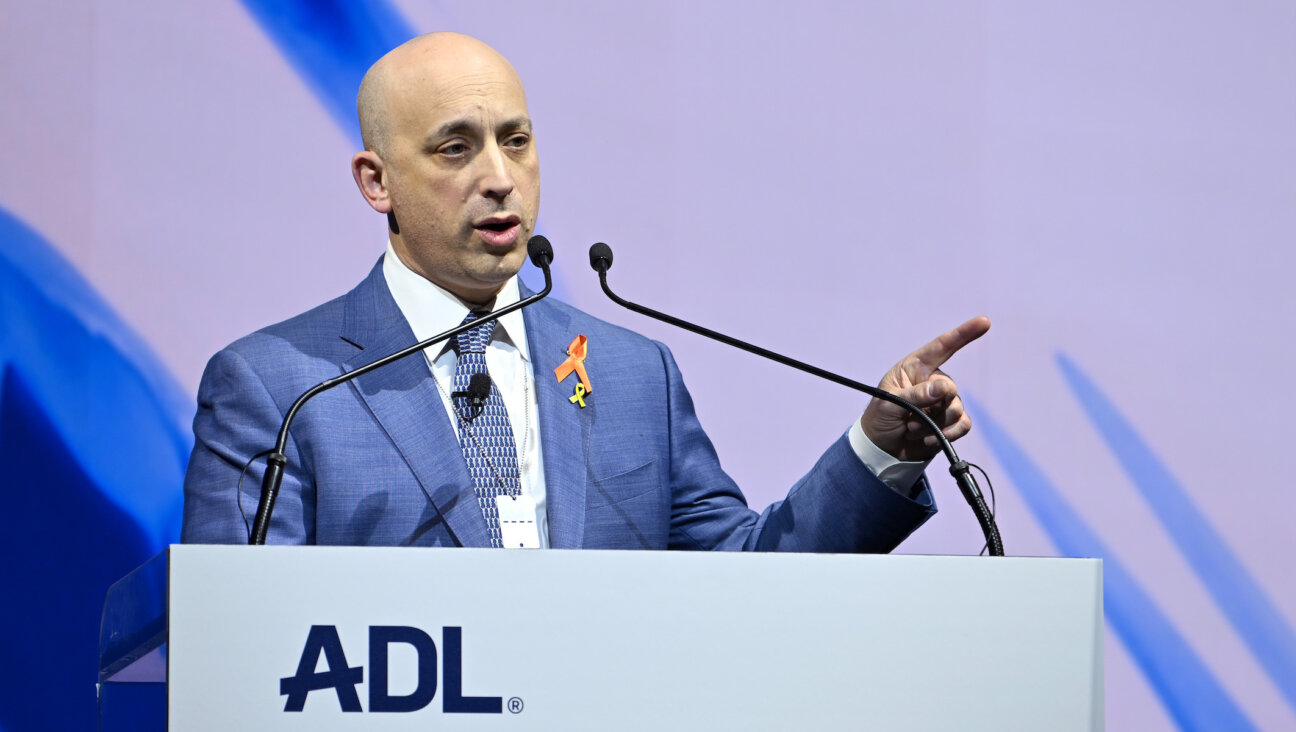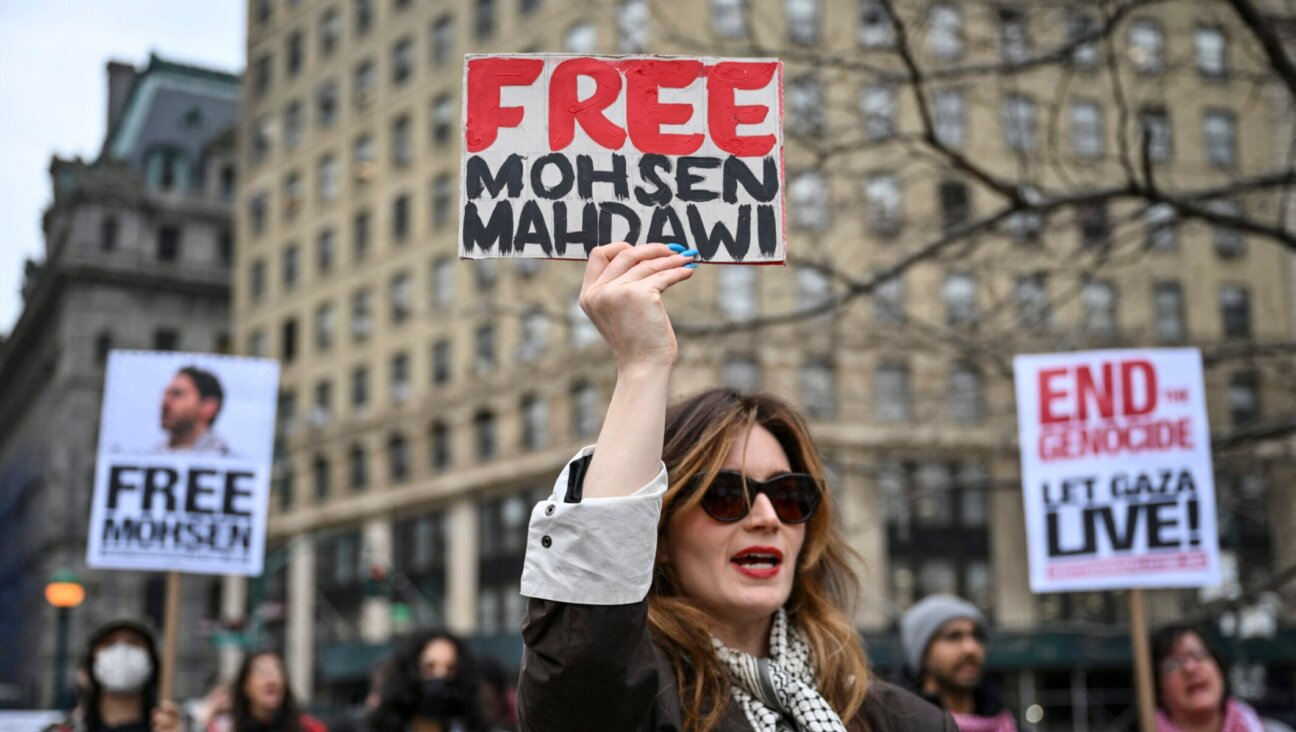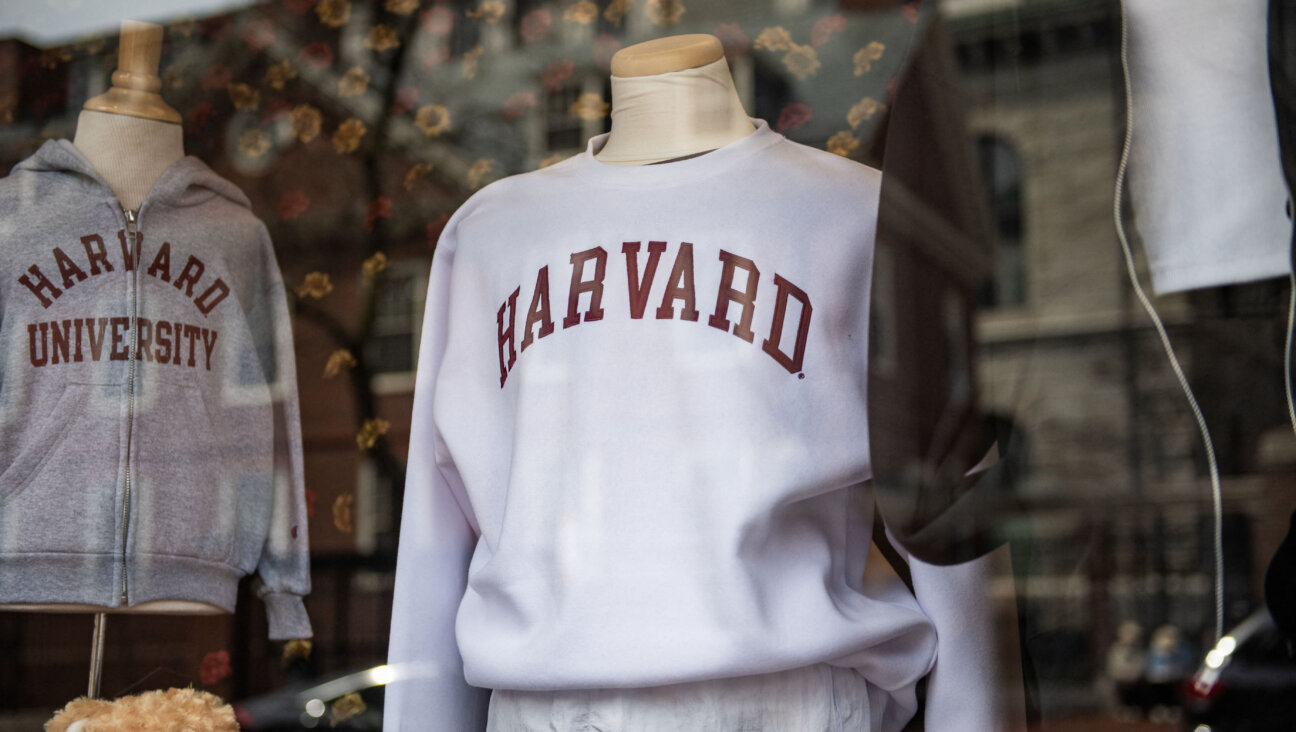Leading a Congregation That Has a Showbiz Pedigree
All rabbis like to gush about their congregations. They’ll boast about high membership, the quality of their Hebrew school teachers or money raised for tsunami victims.
But Rabbi Josh Simon of Congregation Ezrath Israel in Manhattan’s Hell’s Kitchen tends to brag about other things — like the fact that two of the Three Stooges were once members of his synagogue.
“I think it was Larry and Moe,” Simon said. He doesn’t know where Curly went to daven.
But in those days, Congregation Ezrath Israel — commonly known as the Actors Temple — was the place where nearly all the leading Jewish actors went to pray.
“It was 200 of the finest pants-droppers in human history,” Rabbi Simon said.
Jack Benny has one of the hundreds of memorial plaques that hang proudly on the wall. Songwriters from Tin Pan Alley — the collection of offices along Broadway, housing many of the nation’s songwriters — would show up on Friday nights for services. Famous actors of yesteryear, like Joe E. Brown and Billy Vine, were members in good standing.
“Sophie Tucker sat in the first row every yontif,” Simon said, “even though it was an Orthodox shul.” Nobody objected to someone so heavenly in the men’s section. Besides, Tucker was one of the synagogue’s biggest draws. (Today, above the bimah, there is a piece of stained glass dedicated to her memory. “Her light isn’t doing too well,” Simon remarked sadly. “She really deserves the center window, because she was really responsible for getting all the actors here.”)
Ezrath Israel was founded out of an old fire stable in 1917 as the West Side Hebrew Relief Agency — essentially, a Jewish burial society. Within a decade, the agency was also holding regular minyans and soon became a full-fledged synagogue.
During the 1940s and ’50s, the synagogue bloomed and was kept alive with the help of annual benefits and with donations from its wealthy members. But membership began tapering off in the 1960s as Broadway lost much of its luster, radio gave way to television, nightclubs closed and longhaired California folk rockers became the driving force in songwriting — taking that mantle from the New York Jews who perfected the art.
“Actors, dancers and showbiz people are poor strategic planners,” Simon said. The congregation has suffered as a result.
Today, the Actors Temple is a Conservative synagogue — it changed affiliation in the 1970s — and it is kept alive by its small membership.
Tony Roberts and a handful of other actors still come for the High Holy Days. And though Ezrath Israel still manages to eke out an existence, it probably won’t be able to afford its adoring rabbi much longer. Recently Simon was told that after years of being in debt, the synagogue finally had made it into the black. However, it couldn’t afford to keep him around full time and stay out of debt. “They asked me, ‘Are you free for the holidays?’” Simon said with a laugh.
Oddly, this turn of events doesn’t seem to diminish Simon’s enthusiasm for the synagogue. As he led a reporter around the sanctuary, he spoke fondly about the Jewish yoga classes he’d like to start up and the renovations he has planned.
Brown-haired and thin, and of medium height, Simon, 43, wears a mustache and a wispy triangle of hair on his chin. His father, grandfather and great-grandfather were rabbis — his paternal grandfather, Israel Goldfarb, wrote a popular rendition of the song “Shalom Aleichem” — and it could be said that Simon was always expected to follow in their footsteps. But early in his career, Simon dropped out of the Jewish Theological Seminary.
JTS “was a little too conservative — politically [and] religiously,” Simon said. “There were taboos on friendships with non-Jews.” He quit and decided to become a journalist and an electric guitarist. (Simon happily pressed his new CD, called “Bima: Shabbat,” into a reporter’s hand.)
The rabbi held down various jobs — as a file clerk, a letters-to-the-editor sorter and all sorts of other positions within Time Warner — before he landed a plum position as the rock and religion editor at Life when it was being revived as a monthly magazine in the 1990s.
But after a while, Simon lost interest. “There’s only so many times you can do the same phone interview with the next big [rocker],” he said.
Simon’s second act began a few years before Life folded. (It has since been revived.) He began taking classes at the multidenominational Academy for Jewish Religion, located in Riverdale, N.Y., and became ordained as a rabbi in 2001. He had spent a number of years tutoring and interning at the Actors Temple, so when he was ordained he knew where to go.
Since taking over four years ago, Simon has managed to do much with the fading synagogue. He renovated huge parts of it. He took a reporter into a dance studio on the top floor of the building. “This [room] was filled with garbage,” he said. “There was a beautiful oak floor underneath!”
Simon painted the outside doors bright blue, which drew in neighborhood types. He also began leading more casual services, complete with guitar accompaniment. He managed to boost membership and revenue.
About a year ago, while his wife was pregnant, Simon was diagnosed with brain cancer. He spent the next year ill, but has persevered (despite the occasional memory lapse). The High Holy Day prayer reminding Jews that they might not make it through the year has special resonance for him now.
And he has other reasons to view himself as blessed: Five months ago his wife, Dr. Miriam Bensimhon, gave birth to twin boys.
When asked his sons’ names, Simon looked for the moment as if the question had been a foolish one. What would a rabbi at a former show-business synagogue who used to be a rock writer name his sons?
“Marley and Dylan, of course,” he said.
The Forward is free to read, but it isn’t free to produce

I hope you appreciated this article. Before you go, I’d like to ask you to please support the Forward.
Now more than ever, American Jews need independent news they can trust, with reporting driven by truth, not ideology. We serve you, not any ideological agenda.
At a time when other newsrooms are closing or cutting back, the Forward has removed its paywall and invested additional resources to report on the ground from Israel and around the U.S. on the impact of the war, rising antisemitism and polarized discourse.
This is a great time to support independent Jewish journalism you rely on. Make a Passover gift today!
— Rachel Fishman Feddersen, Publisher and CEO
Most Popular
- 1

News Student protesters being deported are not ‘martyrs and heroes,’ says former antisemitism envoy
- 2

Opinion My Jewish moms group ousted me because I work for J Street. Is this what communal life has come to?
- 3

News Who is Alan Garber, the Jewish Harvard president who stood up to Trump over antisemitism?
- 4

Fast Forward Suspected arsonist intended to beat Gov. Josh Shapiro with a sledgehammer, investigators say
In Case You Missed It
-

Culture ‘Shtisel’ star Sasson Gabay is happy to be back playing a complex haredi Orthodox Jew in ‘Kugel’
-

Fast Forward Noa Argamani, ADL’s Jonathan Greenblatt among over a dozen Jews on 2025 TIME 100 list
-

Fast Forward US claims Mohsen Mahdawi’s activism could ‘potentially undermine’ prospect of peace in Gaza
-

Opinion What Jewish university presidents say: Trump is exploiting campus antisemitism, not fighting it
-
Shop the Forward Store
100% of profits support our journalism
Republish This Story
Please read before republishing
We’re happy to make this story available to republish for free, unless it originated with JTA, Haaretz or another publication (as indicated on the article) and as long as you follow our guidelines.
You must comply with the following:
- Credit the Forward
- Retain our pixel
- Preserve our canonical link in Google search
- Add a noindex tag in Google search
See our full guidelines for more information, and this guide for detail about canonical URLs.
To republish, copy the HTML by clicking on the yellow button to the right; it includes our tracking pixel, all paragraph styles and hyperlinks, the author byline and credit to the Forward. It does not include images; to avoid copyright violations, you must add them manually, following our guidelines. Please email us at [email protected], subject line “republish,” with any questions or to let us know what stories you’re picking up.













